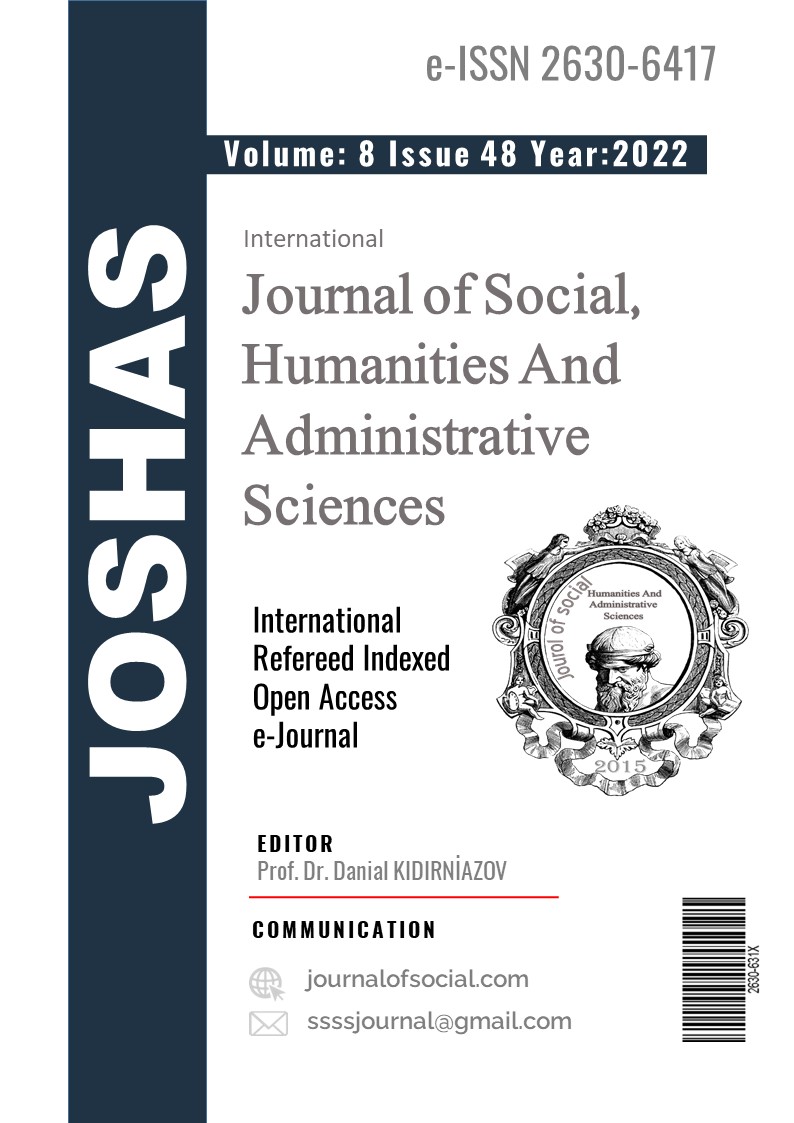Author :
Abstract
Bu araştırmada 2019 -2020 eğitim-öğretim yılında 10.sınıflarda okutulan MEB fizik ders kitabı ve Milli Eğitim Bakanlığı tarafından 2018 yılında yayınlanan fizik dersi öğretim programının bilimsel süreç becerileri bakımından incelenmesi amaçlanmaktadır. Araştırma kapsamında 10. sınıf fizik ders kitabının incelenmesi amacıyla araştırmacı tarafından fizik ders kitabı değerlendirme formu ve 10. sınıf fizik öğretim programının incelenmesi amacıyla da fizik dersi öğretim programı değerlendirme formu geliştirilmiştir. 10. sınıf fizik ders kitabı ve öğretim programı bu formlar kullanılarak doküman incelemesi yoluyla değerlendirilmiştir. Ayrıca, 10. sınıf fizik ders kitabı ve öğretim programı arasındaki uyum Ki-kare testi aracılığıyla belirlenmiştir. Analizler sonucunda, ders kitabının dört ünitesinde de, 10. sınıf fizik ders kitabındaki soruların ölçmeyi hedeflediği bilimsel süreç becerileri ve 10. sınıf fizik öğretim programındaki kazanımların içerdiği bilimsel süreç becerileri arasında anlamlı bir ilişki olmadığı bulunmuştur. 10 sınıf fizik öğretim programının deneysel becerileri içerme oranı yaklaşık olarak %30 iken, 10. sınıf fizik ders kitabında yer alan soruların yaklaşık %6’sının deneysel beceri ölçmeyi hedeflemesi kitap ve öğretim programı arasındaki uyumsuzluğun sebebi olarak görülmüştür. Bu kapsamda, 10. sınıf fizik ders kitabında öğretim programıyla uyumlu olarak deneysel becerileri ölçen soru sayısının arttırılması önerilebilir.
Keywords
Abstract
In this study, it is aimed to examine the MNE physics textbook that was taught in the 10th grades in the 2019 -2020 academic year and the science process skills program published in 2018 by the Ministry of National Education in terms of scientific process skills. Within the scope of the research, the physics course curriculum evaluation form was developed by the researcher to examine the 10th grade physics textbook and the physics curriculum evaluation form was developed to examine the 10th grade physics curriculum. 10th grade physics textbook and curriculum were evaluated by using these forms through document analysis. In addition, the harmony between the 10th grade physics textbook and the curriculum was determined through the Chi-square test. As a result of the analysis, no significant relationship was found between the scientific process skills aimed at measuring the questions in the 10th grade physics textbook in all four units of the textbook and the scientific process skills contained in the 10th grade physics curriculum. While the ratio of the 10-class physics curriculum to include experimental skills is approximately 30%, it was seen that 6% of the questions in the 10th class physics textbook aimed to measure experimental skills as the reason for the discrepancy between the book and the curriculum. In this context, it may be suggested to increase the number of questions measuring experimental skills in accordance with the curriculum in the 10th grade physics textbook.
Keywords
- Arıkan, O. (2018), OKS, SBS VE TEOG fen bilimleri testi sorularının bilimsel süreç becerileri ve eleştirel düşünme
- Arıkan, O. (2018), OKS, SBS VE TEOG fen bilimleri testi sorularının bilimsel süreç becerileri ve eleştirel düşünmebecerilerine göre incelenmesi. Yayımlanmamış yüksek lisans tezi, Kırıkkale Üniversitesi Fen Bilimleri Enstitüsü, Kırıkkale.
- Aydoğdu, B., Tatar, N., Yıldız, E. ve Buldur, S. (2012). İlköğretim öğrencilerine yönelik bilimsel süreç becerileri ölçeğinin geliştirilmesi. Kuramsal Eğitim Bilim Dergisi, 5(3), 292-311.
- Bishop, J. L. ve Verleger, M. A. (2013). The flipped classroom: A survey of the research. In ASEE national conference proceeding, Atlanta, 30 (9), 1-18.
- Bozkurt, E. ve Sarıkoç, A. (2008). Fizik eğitiminde sanal laboratuvar, geleneksel laboratuvarın yerini tutabilir mi?. Selçuk Üniversitesi Ahmet Keleşoğlu Eğitim Fakültesi Dergisi, 25. 89-100.
- Büyüköztürk, Ş. (2004). "Veri Analizi El Kitabı."
- Çepni, S. (2007). Fen ve teknoloji öğretimi. Ankara: Pegem A Yayıncılık.
- Demirci, N. (2003). Bilgisayarla etkili öğretme stratejileri ve fizik öğretimi. Ankara: Nobel Yayıncılık.
- Dökme, İ. (2005). Milli eğitim bakanlığı ilköğretim 6. sınıf fen bilgisi ders kitabının bilimsel süreç becerileri yönünden değerlendirilmesi. İlköğretim Online, 4(1), 7-17.
- Dursun, A. (2014). YGS 2013 matematik soruları ile ortaöğretim 9. sınıf matematik sınav sorularının bloomtaksonomisi ve öğretim programına göre değerlendirilmesi, Yayımlanmamış Yüksek Lisans Tezi, İstanbul Aydın Üniversitesi-Yıldız Teknik Üniversitesi Sosyal Bilimler Enstitüsü, İstanbul.
- Gök, T. ve Sılay, İ. (2004). A Study on the development of a dynamic, variant curriculum refreshing itself continuously. 2nd International Balkan Education Congress, Edirne, Trakya University.
- Koray, Ö., Bahadır, H. ve Geçkin, F. (2006). Bilimsel süreç becerilerinin 9. sınıf kimya ders kitabı ve kimya müfredatında temsil edilme durumları. ZKÜ Sosyal Bilimler Dergisi, 2(4), 147-156.
- Koray, Ö., Bahadır, H. ve Köksal, M. S. (2007). Bilimsel süreç becerilerinin 10. ve 11. sınıf kimya ders kitapları ve kimya ders müfredatında temsil edilme durumları. SAÜ Eğitim Fakültesi Dergisi, 14, 59-68.
- M.E.B., (2018). “Ortaöğretim Fizik Dersi (9, 10, 11 ve 12. Sınıflar) Öğretim Programı”, erişim: 13.11.2021, http://mufredat.meb.gov.tr/Dosyalar/201812103112910-orta%C3%B6%C4%9Fretim_fizik_son.pdf
- Senem, B. Y. (2013). 9. sınıf fizik programı, ders kitabı ve dersinin bilimsel süreç becerileri yönünden içerik analizi. Yayımlanmamış Yüksek Lisans Tezi, Orta Doğu Teknik Üniversitesi Fen Bilimleri Enstitüsü, Ankara.
- Sezer, H. N. ve Alabay, E. (2018). Türkiye'de özdüzenleme ile ilgili yapılmış lisansüstü tezlerin incelenmesi. Akademik Sosyal Araştırmalar Dergisi, 74, 367-384.
- Tan, M. ve Temiz, B.K. (2003). Fen öğretiminde bilimsel süreç becerilerinin yeri ve önemi. Pamukkale Üniversitesi Eğitim Fakültesi Dergisi,13(1), 89-101.
- Taşar, M.F, Temiz, B.K. ve Tan, M. (2002). İlköğretim fen öğretim programında hedeflenen öğrenci kazanımlarınınbilimsel süreç becerilerine göre sınıflandırılması. V. Ulusal Fen Bilimleri ve Matematik Eğitimi Kongresi. (16-18 Eylül 2002). Bildiri Kitapçığı (Cilt I, 380-385). Ankara: ODTÜ Kültür ve Kongre Merkezi.
- Tolan, Y. (2011). Seviye Belirleme Sınavı (SBS) sorularının fen ve teknoloji dersi öğretim programına uygunluğuve bloom taksonomisine göre incelenmesi. Yayımlanmamış Yüksek Lisans Tezi, Atatürk Üniversitesi Eğitim Bilimleri Enstitüsü, Erzurum.





